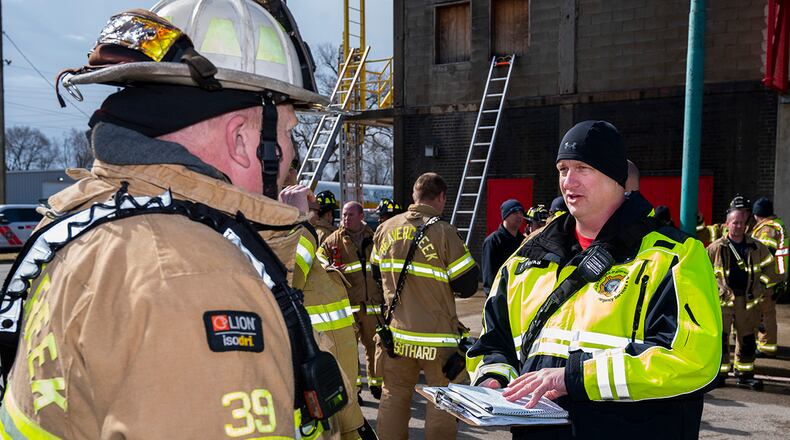“It’s always easier to have somebody else evaluate your performance; or maybe, it’s not easier but it’s more honest,” Beavercreek Fire Chief David VandenBos said.
The call was made to the Wright-Patterson Air Force Base Fire Department.
“We’ve asked Wright-Patterson Air Force Base for some of their chief officers to come over and help evaluate our performance,” VandenBos said. “They are a disinterested, third party who have similar training and similar incident-management techniques.”
It is not unusual for the two departments to work together.
“We’re regular mutual-aid partners, which means that if we have a major incident and we don’t have enough resources, they’ll send resources to support us and then vice versa. We reciprocate as needed,” VandenBos said.
Wright-Patt’s Bryan Weeks, 788th Civil Engineer Squadron assistant chief for training; Mike Roberts, assistant operations chief; and Chase McGrath, division chief, answered the call.
“We work well with them on mutual-aid calls and their training bureau contacted us to do specific training with us because of our ability and our expertise with running command on large-scene incidents,” Weeks said. “They asked if we would come out to do an evaluation of them running exercises, specifically with their command structure and how command operates on an emergency incident.”
The trio stood outside the six-story training tower as crews from different engine companies responded, carrying hoses and other equipment into, and bringing “injured” firefighters out of, the structure. They monitored communications and took notes.
When it was all over, the Beavercreek firefighters gathered around to see how they did.
First, their own officers and chiefs talked to them, then the WPAFB team spoke about what they saw.
“They did great,” Roberts said. “Any training any fire department goes to, and they learn something to improve their processes, is a benefit. You never want to go to an incident, an emergency, and have something catch you off guard.”
VandenBos was grateful.
“It’s been great the support that they’ve provided,” he said. “The fact that they’re willing to come out and stand in the cold with us and give us honest feedback on our performance is helpful.”
Weeks said there is a benefit for the Wright-Patterson department as well.
“This allows Wright-Patt, or at least Chief Roberts and myself, to get a look at how they’re running command on an incident that we could be sending crews to,” he added. “So it’s not only a benefit to help evaluate them and help them be proficient in their incident-command skills, it also allows us to see what we need to make sure our guys know what to expect when they’re coming to do mutual aid with them.”
About the Author


